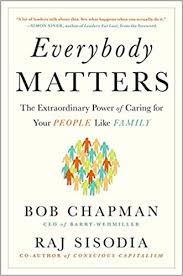Everybody Matters
The Extraordinary Power of Caring for Your People Like Family


Bob Chapman is the CEO of Barry-Wehmiller, the capital equipment and technology solutions company he took over when his father died. After some troubled years Chapman refocused his strategy to prioritise his employees well-being – to such an extent that today the Barry-Wehmiller group use the strapline “we’re the kind of company at which you'd like your children to work”. Raj Sisodia is a co-founder of the Conscious Capitalism movement. He is the Whole Foods Market Research Scholar in Conscious Capitalism and FW Olin Distinguished Professor of Global Business at Babson College in Massachusetts.
In much of the western world old manufacturing businesses are shrinking or closing as production has moved to cheaper locations. The first response to this threat is almost always cost- and job-cutting. This brings a corrosive environment where everyone is fearful for their position. As the authors’ acknowledge “there is a fatal flaw at the heart of capitalist enterprises….from the beginning employees were treated as functions…interchangeable as the parts they laboured to produce.” This is exacerbated by relentless short-termism from management to meet quarterly KPIs for outside analysts. Chapman has built a flourishing business where this approach is eschewed in favour of a longer term, people focused management.
As Simon Sinek writes in the Foreword to this book “we are social animals and we respond to the environment we’re in”. Good people can do wrong in bad environments, and those who have done bad things can be transformed in good ones. The key is the culture – and culture is set by leaders. Central to this is Trust, but as we repeatedly stress in Ideas for Leaders, trust is an outcome not an input. Bob Chapman’s approach at Barry-Wehmiller is “what happens when people throw away long-accepted practices and start operating from their deepest sense of right, with a profound responsibility for the lives entrusted to them”. Chapman sees his primary CEO role as being one “that transcends business performance and begins with a deep commitment to the lives of those in our care.” This involves giving employees the space to make decisions and so improvements, sharing long-term vision, and developing people from within. Above all it requires a mindset where your colleagues are treated as family members – if money is short at home do you get rid of one of the children? Or do you all make changes to improve the situation, accepting some personal costs in the process? This builds trust, loyalty and innovation and a commitment to succeed on behalf of all.
The approach starts with an ‘abundance mindset’, and that includes that there is an abundance of leaders in the business to be fostered and set on a mission. Listen to them – and as Chapman was catalysed by to start his journey from profit to people focused, let them have fun at work.
This book is partly a history of Chapman’s journey with Barry-Wehmiller and the evolution of his Guiding Principles of Leadership, based on stewardship, leadership courage and the Leadership Checklist. But this brings with it insight and instruction on how others can emulate that, and implement the cultural change he regularly has wrought on the failing businesses he has acquired.
Title: Everybody Matters: The Extraordinary Power of Caring for Your People Like Family
Author/s Name/s: Bob Chapman and Raj Sisodia
Publisher: Portfolio Penguin
ISBN: 978-0-241-97541-1
Publishing Date: October, 2015
Number of Pages: 248
Author Knowledge Rating: 1-5 (based on their years of experience, academic expertise in subject areas, and exposure to cross-functional thinking in the area)

















































































Readability: 1-5 score(1=dense and v academic; 5=frantic; page turner)




































































































Appropriate Length: (1=could have been written in 25% of the length;5=could have been longer)


















































































Core Idea Value: (1=nonsense (or entirely esoteric); 5=game-changer)



































































































